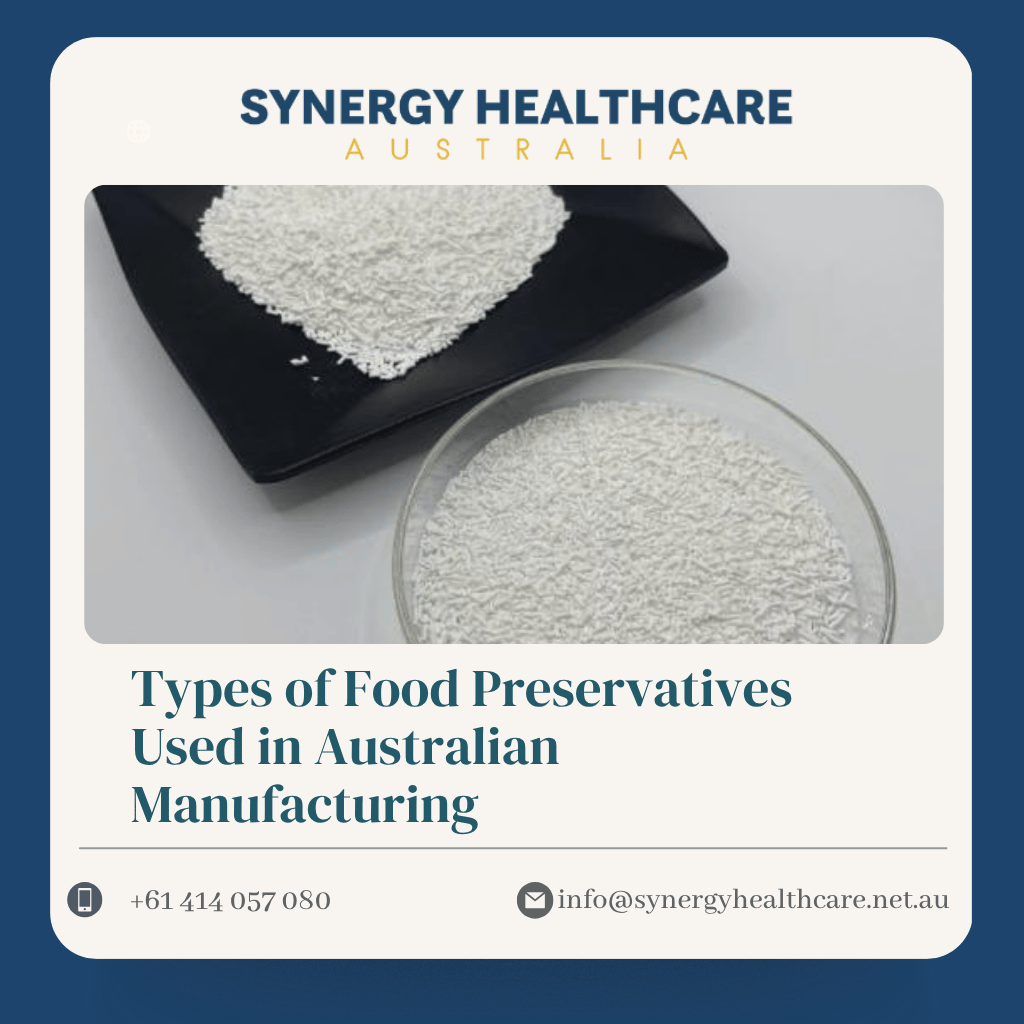Food safety and quality standards are of utmost importance in the Australian food industry, where manufacturers must balance expectations and regulations on one hand, with concerns over shelf life on the other. Preservatives have been considered the solution to this dilemma, as they protect against microbial spoilage, thereby elongating shelf life and ensuring that the ingredient retains its texture, taste, and nutritional quality during the period from factory to shelf.
As the demand for transparency and clean-label foods continues to rise, Australian manufacturers have begun considering a few preservatives to ascertain adherence to both regulatory requirements and consumer trends.
This article focuses on the types of preservatives offered by the food preservatives supplier near you. The application of such preservatives, along with the considerations to bear in mind before selecting a reliable food preservative.
1. Natural Preservatives
This pressure tends to lean manufacturers towards alternatives to synthetic chemicals. Natural preservatives are antimicrobial and antioxidant substances coming from plants, minerals, or through microbial fermentation. Some examples and their common uses include:
- Rosemary extract (0.02–0.1%) – Used to avoid lipid oxidation in oils, meats, and snacks.
- Citric acid (0.1–0.5%) – Mostly used in beverages, sauces, and baked goods to adjust acidity and to prevent microbial growth.
- Natamycin (5–20 ppm) – prevents mould and yeast in dairy, especially cheeses.
Benefits:
- It has a strong market appeal as it aligns with the organic and eco-friendly perception.
- It reduces irritation to certain sensitive food categories.
- Sustainability aspect, allowing plant-based alternatives to synthetic production.
Challenges:
- Shorter shelf life compared to synthetic options.
- Higher cost of procurement, in which organic rosemary extract is three to four times more expensive than BHT.
- Stability problems due to fast degradation at high temperatures for some preservatives.
Having an established relationship with a food preservatives supplier promising certified-organic and non-GMO raw materials helps companies maintain consistency in quality and compliance.
2. Synthetic Preservatives
In Australia, synthetics are viewed by food manufacturers as their main ingredient, as they are affordable, provide broad-spectrum protection, and enjoy time-honoured regulatory approvals despite the scrutiny from consumers. These lab-made preservatives will ensure an unquestionable performance against diverse interfacing food matrices.
Examples and Applications:
- Sodium benzoate (0.05-0.1%), which is used to preserve acidic food items such as soft drinks and fruit juices.
- Potassium sorbate (0.1–0.2%) – inhibiting yeasts and moulds in baked goods, dairy products, and wine.
- Parabens (0.1-0.4%) – under certain strict regulatory conditions, these are mostly cosmetic but also applied in certain food systems.
Advantages:
- Spectrum of mode of action: pathogens (bacteria, yeasts, and moulds).
- More economical by weight in comparison to natural counterparts (e.g., sodium benzoate: $5-10/kg).
- Relatively more stable under varying pH and elevated temperatures.
Challenges:
- Growing consumer resistance due to the perception of synthetic chemicals.
- Regulatory limits such as the cap of sorbate concentrations in dairy by Food Standards Australia New Zealand (FSANZ).
- Allergic reactions are possible for some sensitivities.
When working with food preservatives suppliers, Australian brands must perform checks on FSANZ and Codex Alimentarius compliance to mitigate the risks of stuck shipments, fines, or recalls.
3. Hybrid Preservatives
Hybrid preservatives with natural extracts and synthetic stabilisers, offering a middle ground between consumer demand for clean-label products and functional performances of synthetic additions. These preservatives have gained increased importance in sauces, deli meats, and beverages.
Examples and Application:
- Fermented radish root (0.5–1%) – Used in sauces, condiments, and ready-to-eat meals for natural labelling with improved microbial resistance.
- Sodium lactate (1–2%) – Extending the life of processed meats while enhancing flavour and keeping moisture.
- Ethylhexylglycerin (0.3–0.8%) – Used with natural extracts such as willow bark for synergistic antimicrobial effects.
Advantages:
- Marketing-well-balanced connotation – could be labelled as “cleaner” while assuring high efficacy.
- Flexible and nontoxic with a working pH between 4 and 7.
- They are often more sustainable than the completely synthetic ones due to fermentation processes.
Challenges:
- Higher production costs compared to single-source preservatives.
- Fewer long-term safety studies when compared to traditional preservatives.
- Supply chains are intricate, and they must be carefully managed while sourcing.
Handling and Storage Best Practices
A preservative of any sort will need to be handled correctly to keep it stable and efficacious:
- Natural preservatives (e.g., rosemary extract): ): Store in airtight containers, away from heat and light.
- Synthetic preservatives (e.g., sodium benzoate): Keep in cool, dry places to prevent caking.
- Hybrid preservatives: They need to be segregated from strong acids or bases to avoid reactions.
Australian manufacturers often rely on their suppliers’ technical advice on storage matters to ensure that the product meets both quality standards and safety requirements in the workplace.
Conclusion
Preservatives will always remain an essential pillar for food manufacturers across Australia, so that brands may provide safe and quality products in consideration of consumers’ needs and regulations.
Synergy Healthcare is the best food preservatives supplier, providing well-trusted sourcing for your food business, tailor-made to industry needs. With our strong network and insight into the field, the manufacturers are assured of receiving preservatives that conform to the safety requirements while maintaining the acceptable value of the preservative in the market.





